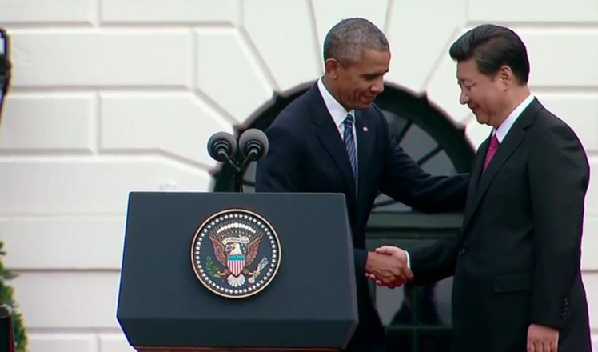Xi's state visit surfs tide of American public opinion
- By Kyle Calandra
 0 Comment(s)
0 Comment(s) Print
Print E-mail China.org.cn, October 1, 2015
E-mail China.org.cn, October 1, 2015
|
|
|
U.S. President Barack Obama held a grand ceremony to welcome Chinese President Xi Jinping Friday morning at the South Lawn of the White House. [Photo / Chinadaily.com.cn] |
Chinese President Xi Jinping embarked on his first state visit to the United States last week amid a climate of rising tensions between the two nations. Seen in many ways as a means of directly addressing these tensions, Xi's visit has had a considerable effect on the current and perhaps future state of Sino-U.S. political and economic relations. However, has his visit done enough to positively influence American public opinion?
A survey, conducted by the Pew Research Center and released ahead of the Chinese President's visit, highlighted the American public's growing concerns regarding the middle kingdom. According to the survey, Americans "see a number of issues related to China and its rising power as major concerns." Among these concerns are the issues of Cyber Security, China's environmental impact, the country's growing military power and the two countries' complex economic relationship. Perhaps the most revealing aspect of the survey is that "only 38 percent of Americans view China favorably, down from 51 percent just four years ago."
How has Xi's visit addressed these concerns?
Throughout his tour of the United States, Xi has maintained the continued rhetoric of "a new model of major-country relations" championed by Chinese and American policymakers. During Xi's visit, he and Obama worked to reach consensus on the many pressing areas of concern, taking this "new model" out for a test drive.
China and the United States have agreed that neither country's government will conduct or knowingly support cyber-enabled theft of intellectual property. Both countries will establish a joint dialogue mechanism on fighting cybercrimes, and have agreed to establish a hotline which will act to directly abate escalating tensions.
In consideration of environmental concerns, both countries have spoken highly of the China-U.S. Joint Presidential Statement on Climate Change and have committed to working together to encourage the success of the Paris Climate Change Conference.
Additionally, China and the United States have reaffirmed their commitment to promote lasting dialogues to accelerate the development of the China-U.S. military-to-military relationship, vowing to build a "relationship of positive interaction and inclusive cooperation in the Asia-Pacific Region," according to China.org.cn.






